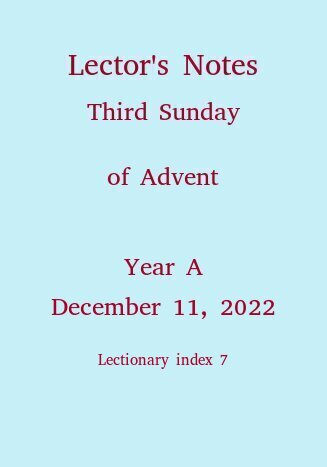

Third Sunday of Advent, December 14, 2025
To despairing exiles, Isaiah speaks a hopeful vision: The desert blocking their way home will be transformed into blooming meadows. People too weak to travel will be strengthened. An absent God will reappear gloriously.
The letter of James contains some elements reflective of very early Christian controversies, and some elements suggesting later composition. This passage still implies that the audience expected Jesus to return in glory soon. The author gives examples of patient waiting.
This passage aims to settle some early Christian questions about the role of Jesus versus the role of John the Baptist.
The Historical Situation: The context of Isaiah's prophecy is very different. As we observed last week, covering an earlier chapter from the same section of Isaiah, the prophet wanted to stir up hope among his people, hope that God would soon intervene dramatically to change their world and their fortunes. The Israelites were languishing in exile. A barren desert lay between their home and the land of their captivity. So Isaiah prophesies several ways that God will relieve all this:
If it will help, think of a situation where you've given or heard a great pep talk addressed to dispirited people. That's what Isaiah was doing.
The Historical Background: The origins of this letter and the situations that prompted its author are controversial. A good description of the various possibilities is in the "Introduction to The Letters to All Christians" in The New Jerusalem Bible (Garden City, New York, USA: Doubleday & Company, Inc., 1985, and other publishers in many languages, but not to be found online yet.) Another introduction is here. What puzzles this writer about today's passage is this: the letter of James is so innocent of the theological controversies that occupied Saint Paul, one is led to think that James is a very late letter, just like Sirach and the Book of Wisdom are late entries in the Hebrew canon. (That James is a late book is also apparent from the fact that many Christian communities were late in accepting it as part of the inspired canon; see any introduction to the letter.) But the expectation of Jesus' imminent return did not last very long in the early Church. Even within Saint Paul's lifetime, that expectation waned, and the Apostle's later letters, like the gospels, reflect the conviction that Christians are going to be struggling on earth indefinitely, and need to find ways to be faithful that are not limited to readiness for an early judgment day.
So what is James doing here, invoking a doctrine that must already have been antique? Perhaps it is just a literary device, like any mature writer uses with a mature audience, an allusion to something the mature will certainly remember, even if it's not the most important thing on their minds any more.
But let this not obscure James' timeless point, that frustrated and especially persecuted Christians need to be patient, whether Jesus is coming soon to vindicate them or not. The prophets to whom he points as examples persevered, whether or not they saw in their lifetimes the fulfillment of their hopes.
Your Proclamation: You may try to prepare for proclaiming this by meditating on the promise of Jesus' return in glory. If that doesn't help you identify a bit with the author James, try praying about your need for patience. Many things frustrate us all in our personal, professional, family and community lives. You'll be reading the Word to people with their own tribulations and unmet expectations. Speak to them sympathetically.
From the Isaiah reading, the vivid image of the lame leaping like a stag prompts this choice of image to adorn this page. This photo is from a now-defunct site known as Arkansas Ties, which invited people to visit points of interest in the state of Arkansas, in the U.S.A. The sculptor, pictured here, is Tim Cherry, who has more to say about his work on his own website, which is up and running as of this update.
This page updated December 6, 2025